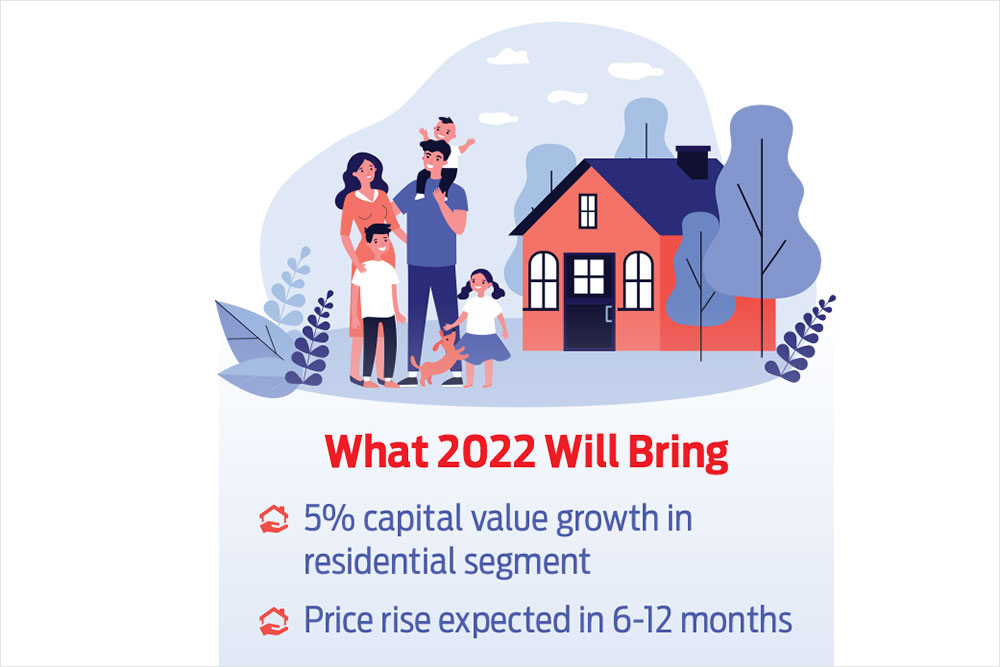The Indian real estate market has been going through a slump for the last five-six years. However, some green shoots are visible now as many real estate developers are banking on the growth seen during the festival season of 2021 continuing into the new year.
In the second half of last year, interest rates on home loans were at an all-time low, and developers sweetened home purchase deals with discounts and other offers during the festival season, ranging from electronic store vouchers of `1-3 lakh to home décor vouchers of `1 lakh. Some developers offered schemes like EMI holidays for a certain period, gold coins on purchase of flats, cash discounts and lucky draws on buying a property.
The home loan rates continue to be low at the beginning of 2022 with the Reserve Bank of India keeping policy rates unchanged in the December monetary policy review.
The future for the real estate industry looks brighter than before in 2022 as developers are going beyond offers and discounts to look at consumer demand trends to woo buyers. “During the Covid pandemic and even before that, developers were giving freebies to attract buyers. Even though the prices were low, such offers were available. In the past few months, however, prices have remained stable. They have not risen or fallen significantly. Demand has been strong, and developers are not relying on freebies or other such offers,” says Rajani Sinha, chief economist and national director-research at real estate global consultancy Knight Frank India.

More Space, Better Design
A senior citizen couple in Gurgaon was happy with their house until the pandemic hit (the couple did not wish to be named). While the house was large enough for their needs, they would go to the neighbouring colony for walks as the space inside theirs was limited. During the lockdowns, they weren’t allowed to enter the other colony. So, when the lockdowns ended, the couple bought a house in an apartment complex further into Gurgaon that had more open spaces and larger balconies, which is what they wanted.
Many people all over India felt the need for spacious houses as families mostly stayed indoors or stepped out only within their apartment block or society premises.
According to a 2022 outlook report by Knight Frank India, features such as good air quality, proximity to green areas and access to good healthcare have become more important than before. As many as 77 per cent respondents in a home buyer survey in 2021 by the same company, indicated that access to large green areas has become more important than before. Gated communities and apartment complexes with large open spaces are expected to remain in demand this year. Facilities such as support staff and security are also tipping the scale.
“A large part of the demand is coming from people who want to upgrade their houses. Many wanted to move from, say, a 1BHK to a 2BHK house or from a 2BHK to a 3BHK house. We are seeing such trends especially in the upper and middle price segments,” says Sinha.
In luxury projects, there is new design demand for a home office, yoga space and decks that offer natural light and ventilation. “Apart from that, people also want end-to-end facilities such as housekeeping, concierge and laundry services,” says Amarjit Bakshi, chairman and managing director, Central Park, a Delhi-NCR based luxury residential and hospitality real estate company.
Developers are responding to consumer demand for better features and use of more technology by incorporating such aspects into projects. “We are strongly looking at adding half a room or a balcony to enhance the value of the product for the consumer,” says Bhasker Jain, head of sales and marketing, Wadhwa Group, a Mumbai-based developer. “We want to offer more value-add features rather than fancy schemes. Consumer mindset and behaviour has also changed after the pandemic. People now appreciate a more efficient space than temporary schemes,” he adds.
While location remains a prime factor in selecting a house, some buyers are ready to trade that for bigger houses. Ramesh Nair, CEO, India, and managing director, market development, Asia, at real estate brokerage Colliers, says that not only is there high demand for ready-to-move-in units and a preference for self-sufficient residential complexes, many buyers are location-agnostic. “They are looking for the largest-size units in peripheral locations of cities,” he says.

Space For Tech
Among the many new aspects that buyers are demanding is the installation of charging points for electric vehicles, both two-wheelers and four-wheelers. While this can be done more easily in under-construction projects, people are looking for retro-fit solutions in projects that are already occupied.
For example, Supertech is installing electric charging points in its project in Greater Noida. It is installing 24 units in the societies with the capacity of 7.4 KVA. According to the company, these are expected to be operational from January 1, 2022.
“As long-term measures, apart from bringing in EV provisions in the parking areas, we are looking at the blueprints to include more green technology, use of solar power and recycling. We are incorporating leak-free drainage systems and high-tech maintenance-free façades so that there is less maintenance and better value for buyers in the long term as well,” says Jain.
Most real estate residential companies are using technology at the front end to interact with potential buyers through chatbots, to be able to provide information 24x7 and resolve basic queries on aspects such as size and location. “We use technology and virtual reality to cut down on the evaluation time. The final decision can be based on the physical location and a more personalised human interaction,” says Jain, adding that 70 per cent of their leads come from enquiries on the digital platform.
High Equity Returns
An upbeat consumer demand for residential real estate is getting support from a reviving economy. Thanks to lower corporate debt, banks and other lenders are flush with funds. “They would like to channelise that money into primary sectors such as agriculture and real estate,” says Jain.
Stock markets gave healthy returns to investors, who then channelised those funds into buying or upgrading residences. This trend was especially observed in cities such as Mumbai, which saw a burst of residential real estate activity in the third quarter of 2021. The uptick was seen across major cities in India.

According to Knight Frank India’s India Real Estate Update for July-September 2021 period, while the second quarter was muted across cities, sales picked up in the third quarter. The number of units sold in Kolkata, Hyderabad, Bengaluru, Chennai and NCR were more than or almost at the same level as the sales in the first quarter.
The strong stock market sentiment continues for 2022—Morgan Stanley expects the Sensex to hit 70,000 in a bull phase, while brokerage Jefferies is overweight on housing in India. The new year is likely to be positive for stock market investors. The Sensex returned 20.03 per cent (year to date) while Nifty returned 22.11 per cent between January 2021 and December 16, 2021. Good times for real estate are expected to roll into 2022 on the back of the market sentiment.
What Should You Do?
Home loan interest rates are low at present and are likely to remain so for about six months or longer. However, these are expected to be revised upwards. “Buyers are also aware of that and are coming forward to buy now,” says Sinha.
While the offers are aplenty in the market, be careful not to be swayed by them. While some of them may offer genuine benefits to the buyer, others may just be marketing gimmicks. So, the homebuyer needs to do the due diligence before taking the plunge. For instance, some developers offer a GST waiver. However, the 12 per cent GST is levied only on under-construction projects and not on ready-to-move homes. If you are settling for the latter, the property may anyway be GST-free.
When it comes to freebies, it makes sense to check if their value can be fully deducted from the price of the property. If it is possible to negotiate a cash discount, go with that instead of a freebie like a phone or furnishings.
Moreover, nominal discounts could be negotiated during the non-festive season as well. So, seek informed opinion on prices without the discounting and then compare the benefits of the festive season offers.
Sales are up but sellers still need to clear stock and close deals, so you may be able to negotiate more. Offers and freebies make more sense if you are already planning to buy a house. Rushing to the decision lured by offers may not be wise. Keep in mind the builder’s credibility, connectivity of the area, proper planning, amenities, and design. Look for a property that suits your needs and budget.
kaveri@outlookindia.com

